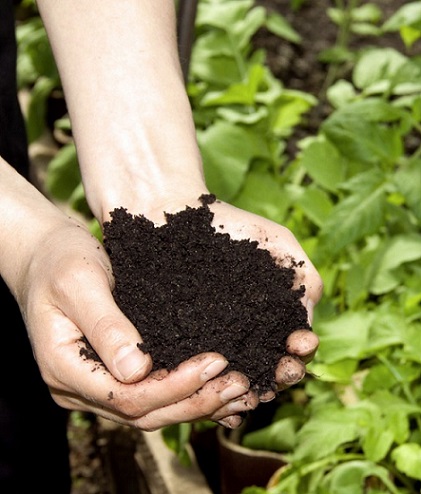 For organic gardeners, the key to growing quality vegetables and fruits, long-lasting ornamental shrubs and trees and abundant quantities of flowers, is creating soil that is rich in nutrients and humus. The overall viability and fertility of the soil, instead of applying fertilizer as a quick fix, lies at the heart of what organic gardening is all about.
For organic gardeners, the key to growing quality vegetables and fruits, long-lasting ornamental shrubs and trees and abundant quantities of flowers, is creating soil that is rich in nutrients and humus. The overall viability and fertility of the soil, instead of applying fertilizer as a quick fix, lies at the heart of what organic gardening is all about.
However organic gardeners, like all gardeners, must start someplace. Your soil might be deficient when it comes to certain nutrients. Its soil structure might not be good. The pH level might be too low or too high. Unless you are fortunate enough to have perfect soil, you will need to do some work in order for it to provide you with ideal conditions for gardening.
Organic Vs. Chemical
Numerous organic materials work as both soil conditioners and fertilizers by feeding both plants and soil. That is one of the more important and distinctive differences between an organic approach and chemical approach towards fertilizing and soil care. Mineral salts are contained in soluble chemical fertilizers that can be absorbed quickly by plant roots. However, those salts don’t provide a source of food for earthworms and soil microorganisms, and even earthworms will be repelled due to the soil being acidified. Over time, soil that is only treated with synthetic chemical fertilizers will lose the critical living organisms and organic matter that help with building quality soil. As water-holding capacity diminishes and soil structure declines, an increasing amount of chemical fertilizer that gets applied leaches through the soil. This in turn results in an ever-increasing amount of chemicals being needed to stimulate growth of plants. When organic fertilizers are used, your soil being thrown into this type of crisis condition is avoided.
The manufacturing process of a majority of chemical fertilizers is dependent on nonrenewable resources, like natural gas and coal. Others are manufactured through the use of acids to treat rock minerals so that they are made more soluble. Fortunately, an increasing number of organic fertilizers are becoming available in the marketplace. Those products are made out of mined rock minerals or natural animal and plant materials. However, the national standards distinguishing and defining organic fertilizers versus chemical fertilizers are complex, so it can be difficult being certain that a commercial fertilizer product that is labeled as “organic” really contains only natural and safe ingredients. Search for products that are labeled “low analysis,” “slow release” and “natural organic.” Be very cautious of any products that are labeled organic with a nitrogen-phosphorus-potassium (NPK) ratio of over 15. Ask he owner of a reputable garden center to recommend brands of fertilizers meeting organic standards.
How To Use Organic Fertilizers
If you happen to be a gardener wanting to switch to organic fertilizers from chemical ones, you may be afraid that it will be less convenient and more complicated to use organic materials compared to premixed chemical fertilizers. However, this is not true. Blends of organic fertilizers can be as effective and convenient as blended synthetic fertilizers can. Your plants don’t need to be organically custom fed unless you enjoy this activity. So although some experts might spread some bone meal around tomatoes plants at planting time, and some bone meal when they are about to blossom, a majority of gardeners are satisfied applying general organic fertilizer one to two times throughout their gardens.
Convenient products such as liquid seaweed and organic dehydrated organic cow manure pellets make fertilizing containers and houseplants easy as well. (Fish emulsion should not be used indoors, however, due to its strong odor. It should be saved for garden plants and outdoor containers.)
If you would like to use a plant-specific approach with your fertilizing, various specialty organic fertilizers can be used. They are available from mail order companies in addition to most good home and garden centers. There is everything from rose fertilizer and organic tomato mixes to specific organic fertilizers mixes created especially for containers, heavy bloom production, lawns and transplants.
Custom mixes can also be made for addressing the specific needs of your plants. For instance, for nitrogen sources you can use fish meal, chicken feather meal, blood meal, composted chicken manure, bat guano or bird guano. Greensand and kelp are good potassium organic sources and a good phosphorus source is bonemeal.